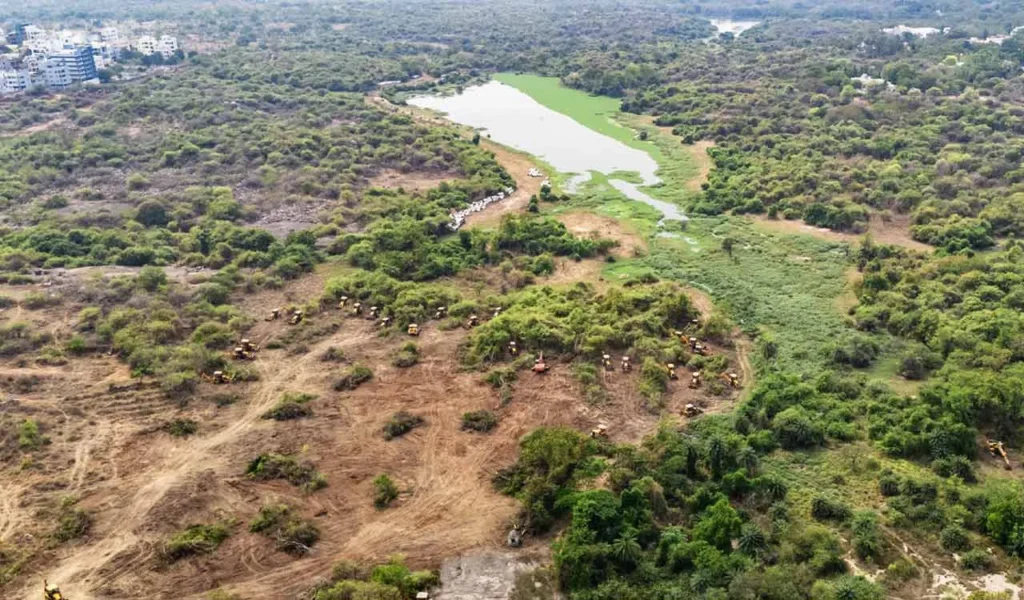Kancha Gachibowli Student Victory: A Triumph of Student Activism and Environmental Justice in Hyderabad
In an inspiring display of unity, resilience, and environmental consciousness, students from the University of Hyderabad (UoH) have emerged victorious in the contentious Kancha Gachibowli case. This remarkable achievement not only highlights the power of youth-led movements but also reaffirms the pivotal role of legal institutions in safeguarding ecological balance against the growing pressures of urban development.

The Green Heart of Hyderabad Under Threat
Kancha Gachibowli, a serene expanse of greenery adjacent to the University of Hyderabad, had long been a refuge for students, local residents, and biodiversity alike. Nestled within the bustling IT corridor of Gachibowli, this verdant stretch offered a natural buffer between the city’s concrete sprawl and the academic haven of UoH. It was home to a variety of native flora and fauna, some of which are unique to the Deccan Plateau.
However, in late 2024, tensions rose when reports emerged that the Telangana state government had designated nearly 400 acres of this green belt for a massive urban development project. The proposal included plans for commercial complexes, luxury housing units, and high-rise IT parks. This move sparked outrage among students, faculty, and environmentalists who feared irreversible ecological damage and the loss of one of Hyderabad’s last green lungs.
The Spark of Resistance: Students Take the Lead
What followed was nothing short of a grassroots revolution. Students from the University of Hyderabad, deeply concerned about the environmental degradation and potential deforestation in Telangana, organized peaceful protests, awareness campaigns, and community outreach programs. Their movement, grounded in ecological ethics and constitutional rights, quickly gained momentum and caught the attention of national media.
Social media platforms buzzed with hashtags like #SaveKanchaGachibowli, #HyderabadGreenFight, and #StudentVoicesMatter. Volunteers organized tree walks, nature photography exhibitions, and public seminars to educate citizens about the ecological significance of the area. They highlighted how urban expansion without environmental planning could lead to increased pollution, water scarcity, and rising urban temperatures—issues already plaguing parts of Hyderabad.
The Legal Battle: Supreme Court Steps In
Despite growing public support, the state government proceeded with its plans, and deforestation activities began in early 2025. Bulldozers and construction crews entered the area, felling dozens of trees and flattening sections of land. This aggressive development triggered a fresh wave of protests on campus, with students staging hunger strikes and peaceful sit-ins.
Alarmed by the scale of destruction and the lack of environmental clearance documentation, a group of students, supported by environmental NGOs and legal experts, filed a petition with the Supreme Court of India. Their case centered on two main arguments: the violation of environmental protection laws and the need for inclusive dialogue before executing projects that impact public spaces and academic institutions.
In a landmark decision, the Supreme Court issued an immediate stay on all construction and deforestation activities in the Kancha Gachibowli area. The court further directed the Telangana government to form a ministerial committee comprising representatives from universities, environmental scientists, civil society groups, and student leaders to assess the ecological and social impacts of the proposed development.
A Campus Rejoices: Victory and Vigilance
The Supreme Court’s intervention was met with jubilation on campus. Students danced, hugged, and lit lamps in front of the iconic UoH Administrative Building, celebrating what they saw as a validation of their efforts and values. A victory rally was held, not just to mark the end of a battle, but to underline the need for sustained vigilance and advocacy.
Post-verdict, classes resumed in full swing, and student leaders were invited to share their experiences with younger batches to inspire continued civic engagement. The movement also sparked similar awareness campaigns in other parts of Telangana and across India, where students began examining local development projects for potential environmental violations.
The Message: Development Must Not Come at Nature’s Cost
The Kancha Gachibowli case is a defining moment in the conversation around urban development vs ecology. It serves as a reminder that while cities must evolve to accommodate growing populations and industries, this progress should not come at the cost of environmental sustainability.
Through their actions, the students of Hyderabad have demonstrated that development and conservation can coexist, but only if public discourse, scientific planning, and legal oversight are prioritized. They have also proven that young voices are not only capable of challenging powerful systems but also of shaping a future that values balance over unchecked growth.
Looking Ahead: A Blueprint for Student-led Change
The Kancha Gachibowli protests have set a precedent in more ways than one. It exemplifies how focused, peaceful, and strategic student activism can bring about tangible change, especially in matters related to public good. By leveraging a combination of social media awareness, legal action, and grassroots organizing, the students created a holistic resistance model that can be replicated elsewhere.
Environmental education has since been prioritized within the UoH curriculum, and the university administration has committed to creating an official Green Council comprising students, professors, and ecological experts. This council will monitor future development projects around the campus and advocate for sustainable practices.
The victory at Kancha Gachibowli is more than just a halt to tree-felling or a legal win—it is a cultural and civic milestone. It reaffirms that in the face of powerful lobbies and bureaucratic apathy, informed and passionate citizens can reclaim their right to clean air, natural spaces, and a sustainable future. As the trees of Kancha Gachibowli continue to sway in the breeze, they now do so as silent witnesses to the courage and clarity of a generation that refused to stay silent.
Follow BuzzTimes for more news updates










I don’t think the title of your article matches the content lol. Just kidding, mainly because I had some doubts after reading the article.